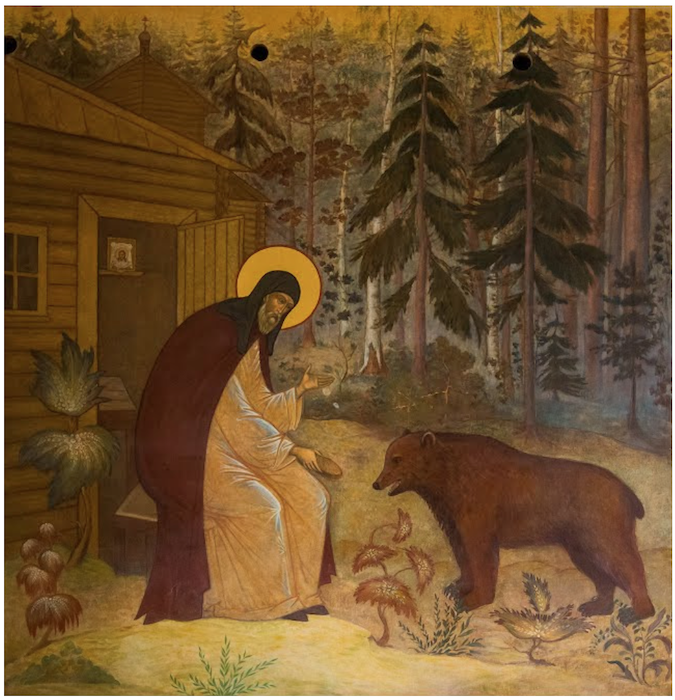Readings for the feast day of Sergius of Radonezh, September 25, 2020:
Although a number of charisms and miracles are attributed to Sergius of Radonezh, with us only being a week and a day away from the Feast of St. Francis, let’s learn a little more about “Russia’s version of Francis” on our calendar of saints!
Sergius of Radonezh was born with the given name of Bartholomew sometime around 1314. (We really only know the date of his death, and he reportedly died at the age of 78. His older brother Stefan had chosen the monastic life, and Sergei followed suit, being given the name of Sergius (Sergei). Yet almost from the get-go he started persuading Stefan that the two of them should move to a more secluded spot to practice their vocation, and eventually the two of them settled in the woods.
Here’s where his hagiography and the wilds of nature intersect–supposedly he was so holy that a variety of animals including wolves and bears were sent by the Devil to frighten him. Yet Sergius was steadfast in his prayers and devotions, and all of the animals eventually gave up trying to torment him–except one bear. Sergius, however, sensed that the bear was really only wanting food, so he left him the only thing that an ascetic monk had to offer–a slice of bread, which the bear readily accepted. This became a regular practice between the two, and on the days Sergius only had one slice of bread, he gave it to the bear. On the days Sergius had nothing to give, the bear hung around for a while and left–yet the bear never got the alternative idea to eat Sergius instead. You might say they came to an understanding of one another.
So why should we care about a hermit-y old dude in the Russian wilderness who shares his bread with a bear? Although it wasn’t one of our readings today, I’m reminded of what Paul says in Romans 8:19-21: “For the creation waits with eager longing for the revealing of the children of God; for the creation was subjected to futility, not of its own will but by the will of the one who subjected it, in hope that the creation itself will be set free from its bondage to decay and will obtain the freedom of the glory of the children of God.” Mind you, this is coming from me, the quintessential “Outdoors Girl,” but I read that passage as “All of nature is waiting on us to get our act together so the whole of creation can experience God’s magnificence.”
I can’t help but think how leading scientists are firmly convinced that the frequency and intensity of hurricanes in recent years is a byproduct of climate change. It’s not lost on me that the El Dorado wildfire was the result of a firework used at a gender reveal party. Nature, sadly, is still waiting for us to get our act together. Yet at the same time, our slowed pace of life during the pandemic–particularly during the time so many things were shut down–gave wildlife biologists the once in a lifetime opportunity to study what they now call the “anthropause”–what nature does when we stop moving around so much, and when we stop consuming so much. Granted, there’s quite a bit of observer bias to filter through (Surprise, surprise, we started noticing nature more when we were all mostly sheltering in place); at the same time scientists are discovering that nature, given half a chance, follows the pattern of the old Steve Winwood song–”If you see a chance, take it.”
In that vein, Sergius of Radonezh has the new potential to be a living icon as we start to consider life beyond the pandemic. Will we choose to simply go back to the way things were, seeing the natural world as something to dominate, without a second thought? Or will we choose to share our bread with the bear?
Caption: Sergius and the bear, courtesy of Google Arts and Culture.
Maria Evans splits her week between being a pathologist and laboratory director in Kirksville, MO, and gratefully serving in the Episcopal Diocese of Missouri , as the Interim Pastor at Christ Episcopal Church, Rolla, MO.

